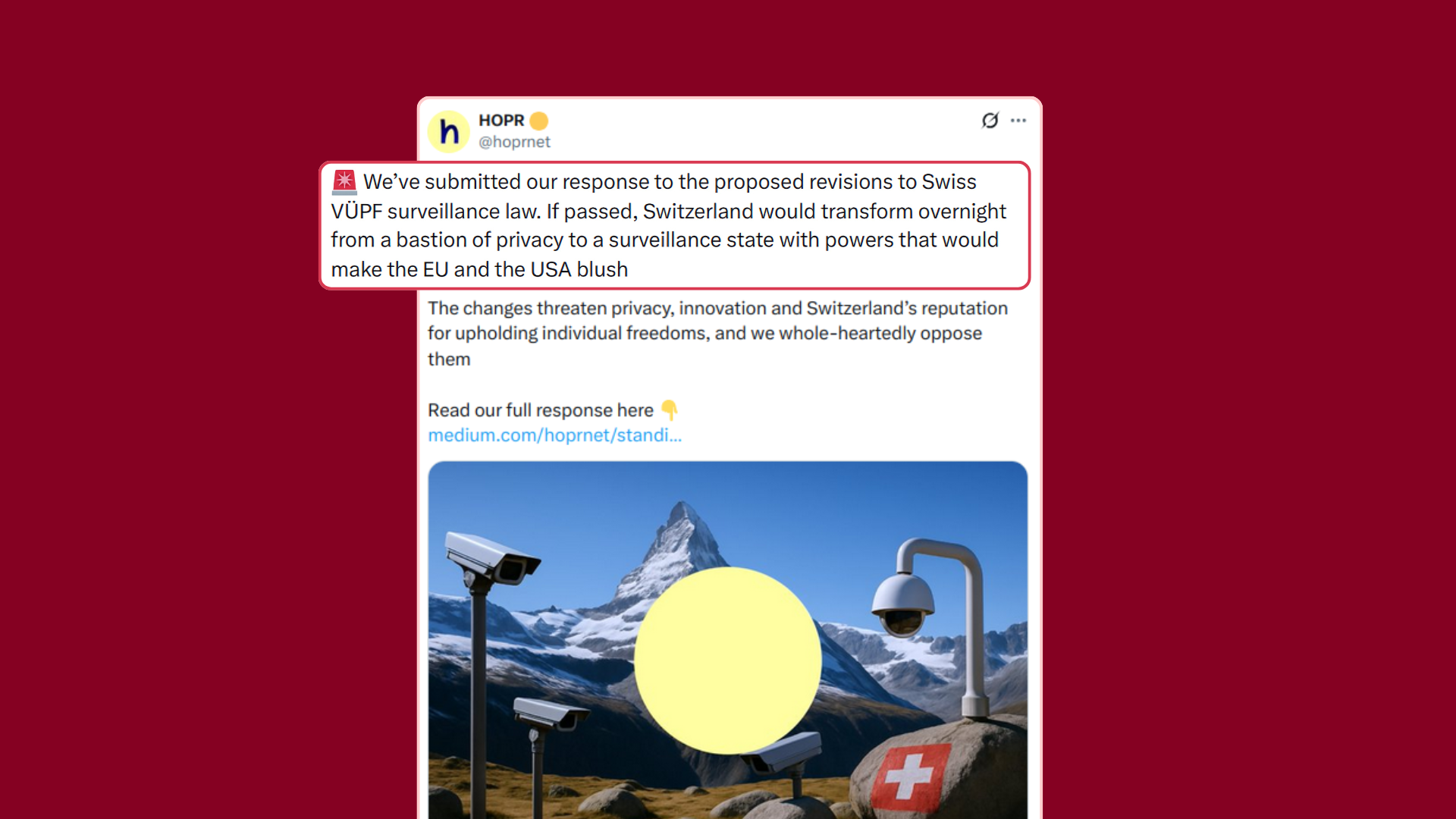Switzerland plans surveillance worse than US
-
The proposed update to Switzerland’s Ordinance on the Surveillance of Postal and Telecommunications Traffic (VÜPF: Verordnung über die Überwachung des Post- und Fernmeldeverkehrs) represents a significant expansion of state surveillance powers, worse than the surveillance powers of the USA.** If enacted, it would have serious consequences for encrypted services such as Threema, an encrypted WhatsApp alternative and Proton Mail as well as VPN providers based in Switzerland.**

Switzerland plans surveillance worse than US | Tuta
Revision of Swiss surveillance law VÜPF would directly target VPN & encrypted chat and email providers based in Switzerland.

Tuta (tuta.com)
-
The proposed update to Switzerland’s Ordinance on the Surveillance of Postal and Telecommunications Traffic (VÜPF: Verordnung über die Überwachung des Post- und Fernmeldeverkehrs) represents a significant expansion of state surveillance powers, worse than the surveillance powers of the USA.** If enacted, it would have serious consequences for encrypted services such as Threema, an encrypted WhatsApp alternative and Proton Mail as well as VPN providers based in Switzerland.**

Switzerland plans surveillance worse than US | Tuta
Revision of Swiss surveillance law VÜPF would directly target VPN & encrypted chat and email providers based in Switzerland.

Tuta (tuta.com)
No fucking way, but mah direct democracy ...
So. Switzerland doesn't really have fully direct democracy in the necessary sense. It's still an old nation-state with laws made in the olden day when you had to compromise. There are many cases where the "direct" part is optional and requires interested people to assemble signatures yadda-yadda. Not good enough to counter a campaign for legal change with a goal. That aside, its system encourages it to have politicians as a thing. Which means that for some issues it will always drift shitward.
It also has separation of 3 kinds of government by degree of locality, but not separation of the "an entity ensuring food safety can't regulate telecommunications" or "an entity regulating police labor safety can't regulate riot police acceptable action" kinds.
(Which is why I usually refer to my preference for a kind of "direct democracy" as a revised one-level Soviet system with mandatory rotation, plenty of places and sortition to state worker roles, despite that not having very good connotations.)
-
The proposed update to Switzerland’s Ordinance on the Surveillance of Postal and Telecommunications Traffic (VÜPF: Verordnung über die Überwachung des Post- und Fernmeldeverkehrs) represents a significant expansion of state surveillance powers, worse than the surveillance powers of the USA.** If enacted, it would have serious consequences for encrypted services such as Threema, an encrypted WhatsApp alternative and Proton Mail as well as VPN providers based in Switzerland.**

Switzerland plans surveillance worse than US | Tuta
Revision of Swiss surveillance law VÜPF would directly target VPN & encrypted chat and email providers based in Switzerland.

Tuta (tuta.com)
This is the first thing I've ever disliked about Switzerland (not that I know a lot about the country).
-
This is the first thing I've ever disliked about Switzerland (not that I know a lot about the country).
There's a reason every billionair has a bank account in Switzerland.
And it's not to pay more taxes. Or to launder less money.
-
No fucking way, but mah direct democracy ...
So. Switzerland doesn't really have fully direct democracy in the necessary sense. It's still an old nation-state with laws made in the olden day when you had to compromise. There are many cases where the "direct" part is optional and requires interested people to assemble signatures yadda-yadda. Not good enough to counter a campaign for legal change with a goal. That aside, its system encourages it to have politicians as a thing. Which means that for some issues it will always drift shitward.
It also has separation of 3 kinds of government by degree of locality, but not separation of the "an entity ensuring food safety can't regulate telecommunications" or "an entity regulating police labor safety can't regulate riot police acceptable action" kinds.
(Which is why I usually refer to my preference for a kind of "direct democracy" as a revised one-level Soviet system with mandatory rotation, plenty of places and sortition to state worker roles, despite that not having very good connotations.)
Democracy is an infant still learning to walk. You plug the holes and add new institutions for oversight. You don't shoot the damn baby and start over because you know how you'd force everyone to do it.
Kowloon wasn't built in a day.
-
There's a reason every billionair has a bank account in Switzerland.
And it's not to pay more taxes. Or to launder less money.
What this says is billionaires are entitled to privacy to hoard their $$$ but nobody else is for everyday life.
-
Democracy is an infant still learning to walk. You plug the holes and add new institutions for oversight. You don't shoot the damn baby and start over because you know how you'd force everyone to do it.
Kowloon wasn't built in a day.
Democracy is an infant still learning to walk.
Bullshit. It's older than gunpowder.
And this argument has been used for every political system in history. Even in USSR in materials approved by censors it was normal to joke about it.
You plug the holes and add new institutions for oversight.
Why don't you do that with real-life mechanisms? A moving part of a machine has corroded enough to have a hole unintended by design. Go on, plug it. Oh, it's better to replace the part.
That aside, I think you've missed my specific arguments, not providing any of your own. Those things about participation as wide as possible and rotation. This means that there should be as many political roles as possible (of a delegate or of a secretary or of anyone), often rotated, with the same person not being able to hold the same or similar post for longer than N months, and with sortition based on some pseudo-random mechanism (pseudo-random to be able to check the results for fraud). To reduce the power of any single delegate or bureaucrat and to make lobbying, bribing and blackmailing them harder. To simultaneously make the population more politically literate - by almost every citizen, ideally, participating in some kind of daily decision-making work. Not voting once a year (at best) from among choices given to them by someone else.
That's what con artists do - provide the victim with an illusion of choice.
You don’t shoot the damn baby and start over because you know how you’d force everyone to do it.
That's exactly what you do. One consistent system does one thing by design. Another consistent system does another thing by design. Something in-between organically evolved does neither. Evolution is the survival of the fittest - fittest for survival. So an organically evolved system is approximating the optimum of power. The status quo.
What it does not approximate over time is any idea of public good. That would be nuts - so, metaphorically, you've built a wooden bridge, do you think it'll become more or less reliable over time under snow and rain and sun? Is a 100 years old bridge better than a bridge just built and tested?
And the optimum of power is formed by the existing system among other things.
Which means that it becomes more and more static and degenerate.
-
This is the first thing I've ever disliked about Switzerland (not that I know a lot about the country).
You've not heard of shady banking, Nazi gold, reluctance to stop dealing with Russia, women not being able to vote until the 70s, and Nestle?
Switzerland gets aggressively simped for online, and there's certainly some nice things about them, but there's also some pretty awful things.
-
The proposed update to Switzerland’s Ordinance on the Surveillance of Postal and Telecommunications Traffic (VÜPF: Verordnung über die Überwachung des Post- und Fernmeldeverkehrs) represents a significant expansion of state surveillance powers, worse than the surveillance powers of the USA.** If enacted, it would have serious consequences for encrypted services such as Threema, an encrypted WhatsApp alternative and Proton Mail as well as VPN providers based in Switzerland.**

Switzerland plans surveillance worse than US | Tuta
Revision of Swiss surveillance law VÜPF would directly target VPN & encrypted chat and email providers based in Switzerland.

Tuta (tuta.com)
Wenn die Schweiz dann ein Überwachungsstaat ist kann sie ja auch gleich in die EU eintreten
-
You've not heard of shady banking, Nazi gold, reluctance to stop dealing with Russia, women not being able to vote until the 70s, and Nestle?
Switzerland gets aggressively simped for online, and there's certainly some nice things about them, but there's also some pretty awful things.
Strong means attractive. Not getting pummeled in WWII and making some profits, being complicit in some crimes (turning back Jews), and in general being on top for many decades make you look strong.
-
Democracy is an infant still learning to walk.
Bullshit. It's older than gunpowder.
And this argument has been used for every political system in history. Even in USSR in materials approved by censors it was normal to joke about it.
You plug the holes and add new institutions for oversight.
Why don't you do that with real-life mechanisms? A moving part of a machine has corroded enough to have a hole unintended by design. Go on, plug it. Oh, it's better to replace the part.
That aside, I think you've missed my specific arguments, not providing any of your own. Those things about participation as wide as possible and rotation. This means that there should be as many political roles as possible (of a delegate or of a secretary or of anyone), often rotated, with the same person not being able to hold the same or similar post for longer than N months, and with sortition based on some pseudo-random mechanism (pseudo-random to be able to check the results for fraud). To reduce the power of any single delegate or bureaucrat and to make lobbying, bribing and blackmailing them harder. To simultaneously make the population more politically literate - by almost every citizen, ideally, participating in some kind of daily decision-making work. Not voting once a year (at best) from among choices given to them by someone else.
That's what con artists do - provide the victim with an illusion of choice.
You don’t shoot the damn baby and start over because you know how you’d force everyone to do it.
That's exactly what you do. One consistent system does one thing by design. Another consistent system does another thing by design. Something in-between organically evolved does neither. Evolution is the survival of the fittest - fittest for survival. So an organically evolved system is approximating the optimum of power. The status quo.
What it does not approximate over time is any idea of public good. That would be nuts - so, metaphorically, you've built a wooden bridge, do you think it'll become more or less reliable over time under snow and rain and sun? Is a 100 years old bridge better than a bridge just built and tested?
And the optimum of power is formed by the existing system among other things.
Which means that it becomes more and more static and degenerate.
Con artists are also known for seeding bits of truth in with their turgid morass.
There are parts of your monologue I'd agree with, but I suspect what your ultimate intent is.
-
No fucking way, but mah direct democracy ...
So. Switzerland doesn't really have fully direct democracy in the necessary sense. It's still an old nation-state with laws made in the olden day when you had to compromise. There are many cases where the "direct" part is optional and requires interested people to assemble signatures yadda-yadda. Not good enough to counter a campaign for legal change with a goal. That aside, its system encourages it to have politicians as a thing. Which means that for some issues it will always drift shitward.
It also has separation of 3 kinds of government by degree of locality, but not separation of the "an entity ensuring food safety can't regulate telecommunications" or "an entity regulating police labor safety can't regulate riot police acceptable action" kinds.
(Which is why I usually refer to my preference for a kind of "direct democracy" as a revised one-level Soviet system with mandatory rotation, plenty of places and sortition to state worker roles, despite that not having very good connotations.)
This is not law yet. The Federal Council (the executive) has started a consultation process at the beginning of the year which ended in May. They are now looking at all the feedback that came in, that was - unsurprisingly - exclusively negative from all sides. If the responsible minister wants to go ahead with it, it goes to the Federal Council for a vote. If they approve it, this would be a decree to change an existing decree and that would come into effect next year or the year after.
And this is where direct democracy comes in: If this is the case anyone can start getting signatures for a public initiative which would change the constitution to prohibit such practices. In fact anyone can start doing that now. If it succeeds, then it'll come to a popular vote. Threema (a secure chat provider) has already announced that they would do that and I'm sure that they wouldn't be the only ones to band together in this.
The process might take long, but this is in no way "not good enough to counter a campaign for legal change with a goal" and in fact has happened multiple times in the past. Hence why Switzerland has a direct vote on issues every few months because of something called "Referendum", whereby a popular vote can be forced on an issue passing through parliament. I might have my criticisms of the political system, but this ain't it.
its system encourages it to have politicians as a thing
Well yes, there is some level of representation, so over 8 million people don't have to decide every little detail on 1000s of changes of law. The system is built upon a "milita" system. I.e. politicians usually have a job. So people have the possibility to vote in experts or their vicinity and know that they won't solely be career politicians. Unfortunately the laws around financing and propaganda are rather lax, giving an advantage to the rich, which leads to an over-representation of the capitalist class with occupations such as lawyers and business-owners and a clear under-representation of classical working-class jobs such as craftspeople or office workers. This is amendable though to correct the mismatch, if people realize their class interest and don't fall for the same right-wing propaganda of a party whose playbook has been inspired by the US GOP for decades and who is inspiring Germany's AfD now.
The main downside of the system imo has to do with people with no knowledge on an issue having to weigh in on them and therefore how powerful propaganda campaigns can be, which means that money buys power, as in every other existing so-called democracy - direct or not. Especially with how money shifts power away from the populace, this is inherent to capitalistic systems and it would be on the populace to protect itself from it. With enough propaganda though, people keep voting for more power of capital unbeknownst to them or not, just as they might vote against their interests on other things. The fact that you have to convince so many people, who hopefully do have some degree of education, makes it a lot harder though, for big capitalists to reach their goals, compared to less direct systems. And I know of several examples, how such a vote did not go in favor of big capital. What usually makes the difference is whether they succeed in portraying their advantage as the advantage of all.
-
No fucking way, but mah direct democracy ...
So. Switzerland doesn't really have fully direct democracy in the necessary sense. It's still an old nation-state with laws made in the olden day when you had to compromise. There are many cases where the "direct" part is optional and requires interested people to assemble signatures yadda-yadda. Not good enough to counter a campaign for legal change with a goal. That aside, its system encourages it to have politicians as a thing. Which means that for some issues it will always drift shitward.
It also has separation of 3 kinds of government by degree of locality, but not separation of the "an entity ensuring food safety can't regulate telecommunications" or "an entity regulating police labor safety can't regulate riot police acceptable action" kinds.
(Which is why I usually refer to my preference for a kind of "direct democracy" as a revised one-level Soviet system with mandatory rotation, plenty of places and sortition to state worker roles, despite that not having very good connotations.)
So. Switzerland doesn't really have fully direct democracy in the necessary sense.
Yes, it's half-direct, who said otherwise? Fully direct on a Nation state level would maybe be possible now with the Internet.
But we can still overrule them, while germans get tired of their politicians lying on elections and doing what they want. Doesn't mean they don't try here.But yeah, this system has it's weaknesses with complicated or emotional topics. But then again, we are all humans.
-
You've not heard of shady banking, Nazi gold, reluctance to stop dealing with Russia, women not being able to vote until the 70s, and Nestle?
Switzerland gets aggressively simped for online, and there's certainly some nice things about them, but there's also some pretty awful things.
I meant current times, not in the past. Sorry, I assumed that would be obvious. There are also some things I like about Germany, though they have a pretty terrible past.
-
Democracy is an infant still learning to walk.
Bullshit. It's older than gunpowder.
And this argument has been used for every political system in history. Even in USSR in materials approved by censors it was normal to joke about it.
You plug the holes and add new institutions for oversight.
Why don't you do that with real-life mechanisms? A moving part of a machine has corroded enough to have a hole unintended by design. Go on, plug it. Oh, it's better to replace the part.
That aside, I think you've missed my specific arguments, not providing any of your own. Those things about participation as wide as possible and rotation. This means that there should be as many political roles as possible (of a delegate or of a secretary or of anyone), often rotated, with the same person not being able to hold the same or similar post for longer than N months, and with sortition based on some pseudo-random mechanism (pseudo-random to be able to check the results for fraud). To reduce the power of any single delegate or bureaucrat and to make lobbying, bribing and blackmailing them harder. To simultaneously make the population more politically literate - by almost every citizen, ideally, participating in some kind of daily decision-making work. Not voting once a year (at best) from among choices given to them by someone else.
That's what con artists do - provide the victim with an illusion of choice.
You don’t shoot the damn baby and start over because you know how you’d force everyone to do it.
That's exactly what you do. One consistent system does one thing by design. Another consistent system does another thing by design. Something in-between organically evolved does neither. Evolution is the survival of the fittest - fittest for survival. So an organically evolved system is approximating the optimum of power. The status quo.
What it does not approximate over time is any idea of public good. That would be nuts - so, metaphorically, you've built a wooden bridge, do you think it'll become more or less reliable over time under snow and rain and sun? Is a 100 years old bridge better than a bridge just built and tested?
And the optimum of power is formed by the existing system among other things.
Which means that it becomes more and more static and degenerate.
Bullshit. It's older than gunpowder.
Compared to how long humanity lived in absolutistic systems (dawn of civilization).
-
No fucking way, but mah direct democracy ...
So. Switzerland doesn't really have fully direct democracy in the necessary sense. It's still an old nation-state with laws made in the olden day when you had to compromise. There are many cases where the "direct" part is optional and requires interested people to assemble signatures yadda-yadda. Not good enough to counter a campaign for legal change with a goal. That aside, its system encourages it to have politicians as a thing. Which means that for some issues it will always drift shitward.
It also has separation of 3 kinds of government by degree of locality, but not separation of the "an entity ensuring food safety can't regulate telecommunications" or "an entity regulating police labor safety can't regulate riot police acceptable action" kinds.
(Which is why I usually refer to my preference for a kind of "direct democracy" as a revised one-level Soviet system with mandatory rotation, plenty of places and sortition to state worker roles, despite that not having very good connotations.)
It's still an old nation-state with laws made in the olden day when you had to compromise.
What democracy does not rely on compromise?
-
I meant current times, not in the past. Sorry, I assumed that would be obvious. There are also some things I like about Germany, though they have a pretty terrible past.
The Nazi gold is still very much a thing. And the descendants of Jewish people who died in concentration camps are often unsuccessful in reclaiming any wealth that was stored in Swiss banks, because they don't have death certificates and what not. Switzerland is incredibly stubborn and selfish when it comes to anything that would tarnish their neutral stance in banking and politics.
-
It's still an old nation-state with laws made in the olden day when you had to compromise.
What democracy does not rely on compromise?
Compromises on principles, not compromises with people.
-
This is the first thing I've ever disliked about Switzerland (not that I know a lot about the country).
For a more extreme example, look to the Principality of Monaco. Being so much smaller, it can be much more extreme.
-
The proposed update to Switzerland’s Ordinance on the Surveillance of Postal and Telecommunications Traffic (VÜPF: Verordnung über die Überwachung des Post- und Fernmeldeverkehrs) represents a significant expansion of state surveillance powers, worse than the surveillance powers of the USA.** If enacted, it would have serious consequences for encrypted services such as Threema, an encrypted WhatsApp alternative and Proton Mail as well as VPN providers based in Switzerland.**

Switzerland plans surveillance worse than US | Tuta
Revision of Swiss surveillance law VÜPF would directly target VPN & encrypted chat and email providers based in Switzerland.

Tuta (tuta.com)
This would be catastrophic to Proton AG
-
-
Distributed Spacecraft Autonomy could enable future satellite swarms to complete science goals with little human help
Technology 1
1
-
-
-
Biologics Market Size, Demand, Analytical Overview, Comprehensive Analysis, Segmentation, Competitive Landscape 2035
Technology 2
2
-
Microsoft Came to Bargain: Use OneDrive for Device Backup, Opt into Loyalty Program and Use Their Products Till You Earn 1000 Points or Pay $30 and They Might Give You Security Updates till Oct 2026.
Technology 1
1
-
-





